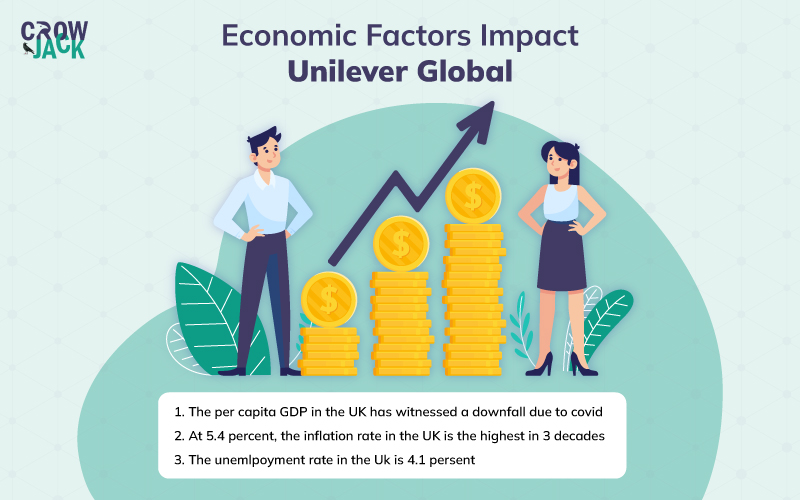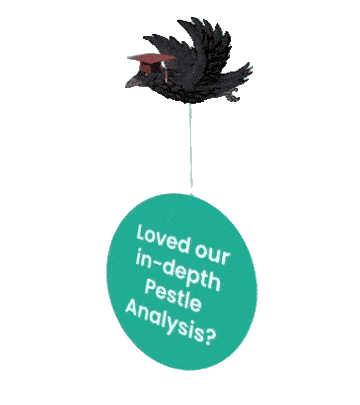Strategic planning holds immense significance for businesses to operate in the enormously competitive business environment that we see today. This is where strategic planning models come into the picture. Among these planning models extensively applied in the contemporary business world, PESTLE Analysis is one of the most commonly used approaches to analysis.
In this article, we have applied the PESTLE Analysis to the objective of carrying out an external industry analysis of Unilever Global. The purpose is to establish a lucid understanding of the PESTLE with its application to a real organization. But before we proceed further, let us first define the PESTLE Analysis tool.
Table of Contents
PESTLE Analysis : A brief overview
PESTLE Analysis delves into the influence of external business factors that impact a given industry and hence the companies in the corresponding industry. PESTLE is an acronym for political, economic, social, technological, environmental, and legal factors that comprise the external business environment. The application of PESTLE offers a comprehensive analysis of how a company’s growth and objectives are influenced by external factors over which a company has no direct control.
Moving forward, going through the Unilever PESTLE Analysis will provide practical implications for the tool.
Unilever Global PESTLE Analysis
Political factors affecting Unilever
The United Kingdom has a stable government and a stabilized political environment that favors a progressive commercial environment in the country. However, the exit of the United Kingdom from the European Union has exposed the retail industry to supply chain problems and other concerns. Also, after the Brexit Deal, new trade regulations with respect to imports from European Unions nations have been imposed by the government from January 2022 that will directly impact the retail sector in the company. The new regulations in the post-Brexit era have led to higher costs and complications for the retail industry. Otherwise, outside Europe, the UK has good trade relations with the largest importers of consumer goods including China, the US, and India. The UK government is further enacting an aggressive strategy to improve its trade relations with nations like India and Israel. Both the UK and India are pressing for free trade agreements starting in the near future.
Economic factors affecting Unilever

The GDP of the United Kingdom is forecasted to grow at 4.7 percent and the inflation rate is 5.4 percent which is the highest in 3 decades. The UK economy is in recovery mode after suffering heavy losses due to the pandemic. The unemployment rate in the country is 4.1 percent while the per capita GDP in the UK fell by more than 3000 Pounds in 2020-2021 due to the fallout of the COVID-19 pandemic. The reduced per capita GDP and income will have a direct impact on the consumer goods industry in the nation. Also, the ongoing supply chain crisis poses a risk of heavy losses to the retail businesses in the country. It is forecasted that retailers in the UK can incur losses of 5.7 percent in the wake of the supply chain problem (Hawkins, 2022).
Social factors affecting Unilever
The United Kingdom is a developed nation and people in the country embrace lifestyles that are strongly dependent on consumer goods including premium segment products. The country has a high level of consumerism and private consumption accounts for more than 63 percent of the country’s nominal GDP ("UK Private Consumption: % of GDP, 1955 – 2022 | CEIC Data", 2022). Also, the United Kingdom has a literacy rate of 99 percent which implies that consumers are educated and aware of the latest offerings by the consumer goods industry. However, the United Kingdom is one of the countries that have been the worst hit by the pandemic leading to heavy loss of jobs in the country hence impacting consumerism and people’s purchasing power.
Also, there is a massive shift in the consumer sentiment in the country, and more than 30 percent of consumers in the UK are prioritizing sustainable brands which can be a huge turning point for the entire retail industry. Moreover, consumers are now preferring to purchase consumer goods via e-commerce channels rather than buying from physical stores. Lastly, social and employee groups in the UK are pushing the demand for a 4 day work week keeping employee burnout in mind. Such uprisings and mounting demands for a 4-day work week will also affect the industry.
Technological factors affecting Unilever
The United Kingdom has a robust technological infrastructure to support the latest innovations and breakthroughs in the retail industry. The UK commits around 1.8 percent of its GDP to research and development purposes. In its bid to emerge as a science and technology global superpower, the UK has committed to dramatically increasing R&D spending to 20 billion pounds by 2025 which can be a huge boost to the retail industry. The retail industry in the country is changing at a swift pace with technologies like IoT, AI, visual search options, digital marketing tools, and so on. The country has an encouraging environment to boost the invention and promotion of great technological innovations. The consumer goods industry can become far more scalable and effective with the use of the right technologies being applied across different stages of business operations.
Legal factors affecting Unilever
Under the Competition Act of 1998, anti-competitive activities in the UK are forbidden by law. If any business or cartel engages in anti-competitive behavior like price-fixing, bid-rigging, etc then a penalty of up to 10 percent of the global turnover can be imposed. This clearly impacts the industry as it forbids the creation of monopoly or price exploitation by a single player or cartel. In addition to that, the Consumer Rights Act 2015, lays down a set of statutory compliances that companies are required to oblige in the best interest of the consumers. The act has different protections and rights that consumers in the UK are entitled to. Various norms under the General Product Safety Regulations Act 2005 are also applicable to consumer goods. Moreover, labeling and packaging laws are also strictly applicable in the UK which dictate that product labeling should show details of ingredients, related warnings, and other relevant information about the product.
Environmental factors affecting Unilever
The United Kingdom is a signatory to the International Paris Agreement and is committed to substantially cutting down on its carbon emissions. Also, the United Kingdom is a party to COP 26. Besides, the country has a 25-year environmental plan in place which will have a huge impact on the functioning of the consumer goods or retail industry. In 2021, the UK passed the Environment Act, 2021 which sets environmental mandates for all stakeholders with respect to air quality, water pollution, waste reduction, and biodiversity. Under the act, a new watchdog has also been established that will overlook the implementation of the act. Also coherent to this act, there is added responsibility on the producers of wastes who will now have to bear 100 percent cost for the disposal of waste starting from single-use plastic.
To add, plastic packaging tax has been introduced in the UK under which companies will be liable to tax if their plastic packaging contains less than 30 percent volume of recycled plastics. This will have a direct impact on the consumer goods industry and packaging practices in the industry and can increase packaging costs or tax liabilities. Furthermore, the UK government is thinking on the lines of stricter bans on single-use plastics in the near future.
To encapsulate, the ongoing supply chain disruptions and the adverse consequences of Brexit can negatively impact Unilever and its current strategies. However, the positive industry trends that Unilever can exploit include modern lifestyles, higher levels of consumerism and increasing inclination towards branded consumer goods. Besides, the UK's commitment to being a science and technology superpower and increased spending in research and development is another positive factor for Unilever. Moreover, to not lose the advantage to sustainable consumer goods brands, Unilever must look to constantly innovate and look to address key environmental concerns like plastic pollution, greenhouse emissions and packaging issues.
Recommended Readings
To encapsulate, the ongoing supply chain disruptions and the adverse consequences of Brexit can negatively impact Unilever and its current strategies. However, the positive industry trends that Unilever can exploit include modern lifestyles, higher levels of consumerism and increasing inclination towards branded consumer goods. Besides, the UK's commitment to being a science and technology superpower and increased spending in research and development is another positive factor for Unilever. Moreover, to not lose the advantage to sustainable consumer goods brands, Unilever must look to constantly innovate and look to address key environmental concerns like plastic pollution, greenhouse emissions and packaging issues.
References
The 20 Biggest UK Companies by Market Cap | CMC Markets. (2022). Retrieved 8 February 2022, from https://www.cmcmarkets.com/en/trading-guides/biggest-uk-companies
Our History | Unilever global company website. (2022). Retrieved 8 February 2022, from https://www.unilever.com/our-company/our-history-and-archives/2010-2020/
Economic trends in the retail sector, Great Britain - Office for National Statistics. (2022). Retrieved 8 February 2022, from https://www.ons.gov.uk/economy/nationalaccounts/balanceofpayments/articles/economictrendsintheretailsectorgreatbritain/1989to2021#:~:text=2.,all%20UK%20employees%20in%202019.
Hawkins, E. (2022). Retailers to lose £5.6bn due to supply chain nightmares. Retrieved 8 February 2022, from https://www.cityam.com/retailers-to-lose-5-6bn-due-to-supply-chain-nightmares/
UK Private Consumption: % of GDP, 1955 – 2022 | CEIC Data. (2022). Retrieved 8 February 2022, from https://www.ceicdata.com/en/indicator/united-kingdom/private-consumption--of-nominal-gdp

 Proof Reading
Proof Reading  Copy Writing
Copy Writing  Resume Writing
Resume Writing  Blogs
Blogs Guides
Guides SOP's
SOP's Student Resources
Student Resources Research Topics
Research Topics Login
Login Register
Register



